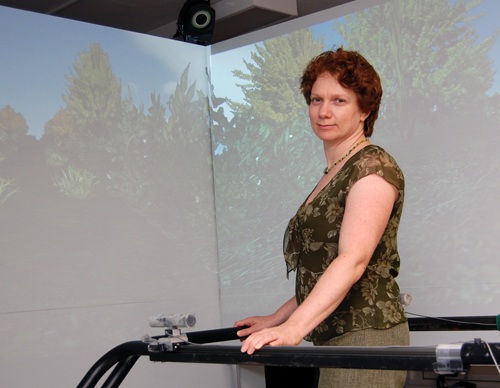Dr. Ilana Levin, PT, DPT, is a current Human Movement Science PhD student. Her research interests include factors contributing to decreased mobility in individuals with neurodevelopmental disabilities (cerebral palsy in particular) and intervention programs to increase functional mobility in this population.

Dr. Ilana Levin, PT, DPT, is a firm believer in the flexibility of the human mind, and her experiences over the past two years in the Human Movement Science (HMSC) doctoral program have only reinforced this outlook. Assisting with faculty research projects and pursuing her own interests, Dr. Levin has repeatedly observed how people with neurological or physical challenges can adapt.
“Even as adults, even when there is some brain dysfunction, people are still interested in changing and adjusting,” she said. “That’s very motivating for me.”
The PhD program has also given Dr. Levin ample opportunity to explore her own mind’s flexibility, as she has transitioned from clinician to researcher and from pediatric physical therapist to working primarily with adults, all while balancing life with her family, which includes her husband, 7-year-old-son, and 3-year-old daughter.
Navigating major life changes is nothing new for Dr. Levin, who emigrated from Latvia to Israel at the age of 8. As a young adult, she served as an electronics technician in the Israeli Army for three years, during which time she began practicing Tai Chi and developed an interest in mind/body interaction that eventually led her to Physical Therapy, as well as appreciation for technology that continues to inform her research. After earning her bachelor’s degree in PT from Tel Aviv University in 1998, she began a career focusing on pediatric patients.
“I had an interest in neurology and development and in order to understand motor control better I felt I really needed to see how it develops, so pediatrics seemed like the way to go,” she said. “I think it also worked with my personality, being able to improvise and be playful. Improvisation is the one of most significant characteristics to have when working with kids. I was able to connect really well with them.”
Dr. Levin practiced in Israel and then in the U.S. after relocating in 2004. She earned her Doctor of Physical Therapy degree from UNC through the transitional DPT program in 2010, and was accepted to the HMSC program for the fall of 2013, receiving a prestigious UNC Graduate Merit Scholarship to fund her first year of study. In addition to taking classes and developing her research focus, Dr. Levin has served as a teaching assistant for online DPT courses and assisted with research conducted by Drs. Mike Lewek and Debbie Thorpe, as well as Dr. Prue Plummer. While her experience as a therapist well prepared her for interactions with research participants, Dr. Levin said her new role has required a shift in thinking.
“While our goals as clinicians are precise, the way we try to implement those goals and the interactions with patients are kind of spontaneous,” she said. “With research, it’s all about standardizing, and it’s been interesting for me to develop new abilities and discipline working within that structure.”
Dr. Levin’s research interests include factors contributing to decreased mobility in individuals with neurodevelopmental disabilities (cerebral palsy in particular) and intervention programs to increase functional mobility in this population. She is especially interested in gait retraining and improving dynamic balance, and aspires to contribute to the development of technology-assisted user-friendly interventions that facilitate motor learning and increase access to health promoting activities.
Dr. Levin said assisting Dr. Thorpe greatly influenced her desire to work with adults with cerebral palsy, a population that has not been widely studied and is greatly underserved. This field of research also gives Dr. Levin a chance to feed a curiosity she developed through her early interactions with people from different cultures.
“One of my motivations in working with people diagnosed with neurological conditions is the opportunity to engage with people whose senso-motor experiences are so different from my own,” she said. “I really enjoy learning their perspectives.”
